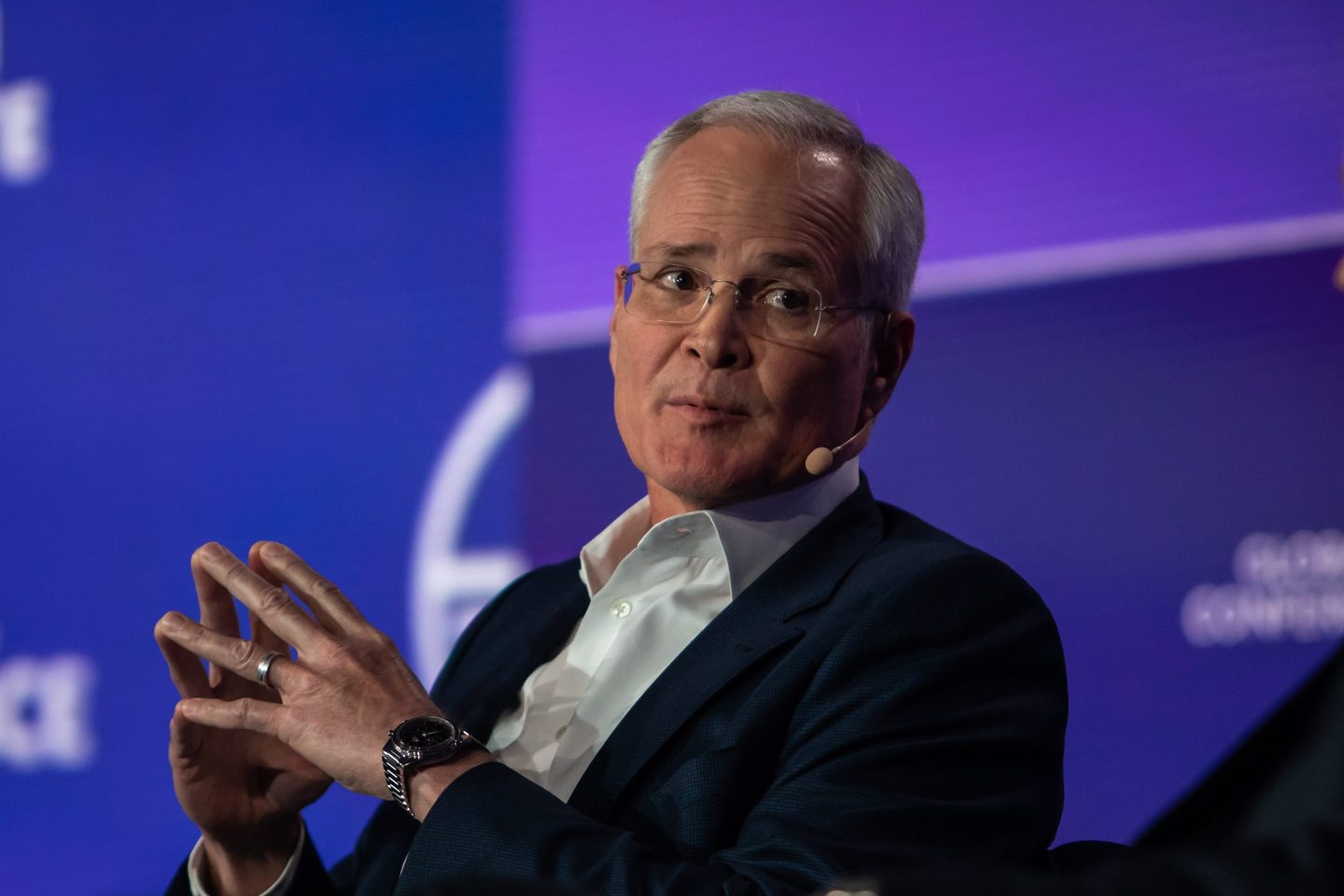One of the biggest bait-and-switches in business is perpetuating the fallacy that individual consumer choices can save the planet.
The notion was most poignantly pushed in a 1971 commercial featuring the “Crying Indian,” who lamented pollution. The ad obscured the environmentally destructive practices of its big business backers—of bottling and beverage companies, like Coca-Cola, American Can Co., and Dixie Cup—and instead shifted the onus (recycling, in this case) onto hapless consumers.
Today there’s a much greater appreciation of the negative eco-impacts of large corporations. Thankfully, many big businesses—ranging from IKEA, to Dow, to 3M, to the Hershey Company—are starting to take the challenge of cleaning and greening up the private sector seriously, as I learned while hosting the Fortune Global Sustainability Forum last week. Some businesses have finally realized how dire the situation is, and are taking action.
And just in time: the United Nations’ Intergovernmental Panel on Climate Change published a report in August calling this moment a “code red for humanity.” The paper noted that humans are to blame for climate change, that some outcomes—like rising sea levels—are irreversible, and that we have only about 20 to 30 years to stabilize global temperatures, lest we prove the Earth doomsayers right, as my colleague Katherine Dunn noted at the time.
Google, for one—a tremendous energy-sucker with its voracious data centers—is trying to do its part. In addition to undertaking a huge overhaul of its operations to achieve carbon zero goals, the online ad giant is exporting its ambitions outside its walls. The company aims to get people to change their lifestyles, thereby doing what it ostensibly does best: Nudging personal behavioral change—the central conceit of advertising—at massive scale.
Toward that end, Google announced a slate of environmentally friendly updates to its products on Wednesday. Its search engine will start showing climate change results from more trustable sources, like the UN. The company will start offering up more eco-conscious options to people shopping for everything from cars to home appliances to flights. Alternative, fuel-efficient routes will start appearing as options on Google Maps. And Nest, Google’s “smart” thermostat, will let people shift their house heating and cooling to times when the electrical grid is serving up more renewable energy.
One notable exception to Google’s updates though: YouTube went unmentioned. The video-streaming site has long been a font of misinformation about climate change, though it has recently tried to clean up some of its virally-charged mind-pollution. Even so, scientific consensus regarding climate change still has a hard time breaking through.
Each of Google’s changes aims to push people to make slightly different micro-economic decisions over the course of their day which, when spread over the entirety of a population, can yield a major impact. Google’s initiatives are commendable. It is using its influence to prod society in the right direction. (It’s for reasons like this that we honored Kate Brandt, Google’s chief sustainability officer, on Fortune’s 40 Under 40 list this year.)
Unlike past corporate sleights of hand, like the Crying Indian marketing campaign, Google isn’t simply passing the buck onto consumers and stepping aside. It’s actively coordinating people to help salvage our imperiled future, and for that we—or our progeny, rather—should be grateful.
Much more needs to be done.
Robert Hackett
@rhhackett
robert.hackett@fortune.com
NEWSWORTHY
Zuckerberg responds. Following what seemed to be an eternity of silence, Facebook CEO Mark Zuckerberg pushed back on Tuesday against the claims that his social network has faced in recent weeks, saying many “don’t make any sense.” Facebook has come under what is arguably unprecedented scrutiny on Capitol Hill and in the public domain since a series of Wall Street Journal articles, as well former product manager Frances Haugen detailing how the company has internally handled its own research on how Instagram influences the mental health of its youngest users and more.
Hackers hit Twitch. On Wednesday, Amazon-owned Twitch, the live streaming service, confirmed that it had suffered from a data breach that included part of its source code and creator payouts. The leak provided a jarring look at the income that streamers are able to bring in through Twitch, with the top streamer earning nearly $10 million from August 2019 to October 2021. More information could be leaked too, as hackers labeled what has been released so far as “part one.”
Partner now, stock rises. Shares of Affirm, the Max Levchin-led fintech whose business revolves around buy-now-pay-later shopping, jumped 20% during trading Wednesday after announcing a partnership with Target that will allow the retailer’s customers to divide up any purchases over $100 into varying installments.
One social media giant’s outage is another’s opportunity. An hours-long shutdown for Facebook’s family of social networks prompted a rush of activity on other sites, according to Bloomberg. Snapchat was the biggest winner, recording a 23% jump in time spent on its Android app on Monday versus a week earlier, the news outlet reported Wednesday, citing data from Sensor Tower. Telegram, Signal, and Twitter all also recorded higher amounts of time spent on their apps.
TikTok to take down any "Slap a Teacher" content. Video sharing app TikTok called the purported challenge among its users to slap a teacher “an insult to educators everywhere” Wednesday, promising to take down such videos. The move comes in response to growing concern about the challenge—along with others on the app—from lawmakers and government officials, including Connecticut’s Attorney General.
FOOD FOR THOUGHT
"A different kind of toll." On Monday, Facebook went dark for hours, leading to a flurry of jokes and backlash from users in the U.S. and other parts of the world. But, in Asia, Facebook is far more than just a platform to fight with your in-laws about the 2020 election. As Fortune's Grady McGregor, Yvonne Lau, and Biman Mukherji chronicled this morning, the outage brought about a "different kind of toll" considering the California-based social media company's platforms serve as a key part of life online.
From the article:
Supul Muhandiram, based in Colombo, Sri Lanka, relies on both Facebook and Instagram to sell his wellness and personal care products because there are few alternatives. “In Sri Lanka, we don’t have any other solid platforms that people trust to sell and buy products,” he says.
Sri Lanka, a country of 21.9 million people, has 7.6 million Facebook users and nearly 1 million Instagram users. Facebook has become ubiquitous in the island country—not only as a social media site for life updates but also as a necessary tool for small-business owners.
Muhandiram is the founder and co-CEO of Ayuva Wellness, which sells high-end toiletries like hair care and lotion through Instagram. Ayuva sells products around the clock, and Muhandiram estimates that 25% of daily Instagram sales were lost on Monday.
Muhandiram says his herbal medicine store, which relies on Facebook for sales, fared better; he estimates it lost only 15% of daily sales due to the outage. But his companies were unable to respond to the customer queries it fields through Facebook—an important means of interacting with customers. Plus, the outage meant that “we had to spend money [on Facebook ads] without making money, and it was something beyond our control,” says Muhandiram. “If an outage can affect your business like that, you feel helpless. You realize that solely relying on an online medium isn’t really a good idea.”
IN CASE YOU MISSED IT
'Here's to better days ahead': In leaked emails, Ozy CEO asks employees to return and shares ambitious goals by Megan Leonhardt and Jessica Mathews
Box CEO on his recent proxy battle victory: 'I mostly just wanted to take a nap' by Jonathan Vanian
Facebook's outage could put off its most important users: Creators by Mike Donoghue
The number of data breaches in 2021 has already surpassed last year's total by Chris Morris
How the pandemic and social upheaval spurred companies to step up by Marco Quiroz-Gutierrez
SoftBank gives school bus startup Zūm a ride to near unicorn status by Lucinda Shen
Some of these stories require a subscription to access. Thank you for supporting our journalism.
BEFORE YOU GO
Whoops, wrong number. Fans of Netflix’s surprise hit Squid Game are dialing up the phone number that the show’s characters call to be invited to a lucrative, but deadly, competition in masses, according to the Wall Street Journal. But the real South Koreans with the same or even similar numbers now find themselves fielding tons of calls and texts, including a South Korean man who shares the exact number featured in the show. He has said that he has been receiving about 4,000 calls daily.











